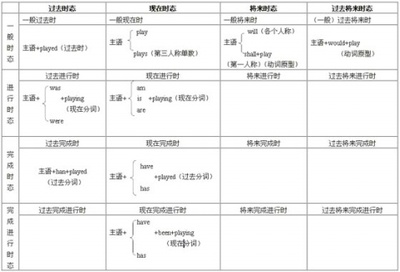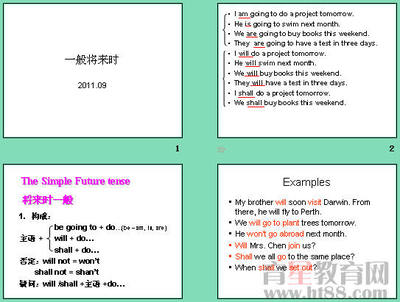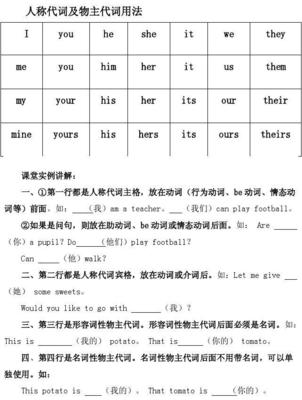一. 一般现在时行为动词词型变化形式
一般现在时动词只有第三人称有词形变化,其他人称动词均用原形单数第三人称动词变化:
多数在动词后加s play—plays like—likes ,
以s,x,sh,ch,o结尾的动词加es go—goes wash--washes,
以辅音字母加y结尾,把y改i再加es fly—flies study--studies
二. 一般现在时动词be和 have的变化形式
1.动词Be 叫连系动词, 连系动词be的用法:除了第一人称单数用am,和第三人称单数用is以外,其它人称用are.
I am busy. You are busy. He (She) is busy. We (You, They) are busy.
2.动词have的用法:除了第三人称单数用has以外,其它人称一律用have.如:
I have a pen. You have a pen. She (He) has a pen.
We (You, They) have pens.
三. 一般现在时的句型
1.肯定句构成:主语+动词 (注意人称变化) +其它成分
Ihave a dog. We like the little cat. She sings well.
2.否定句构成:
行为动词的否定句:主语+助动词(do/does) + not +动词原形+其它成分
He dosen't have a dog. He isn't young. We don't like the little cat.
(借助于助动词do) She doesn't sing well. (借助于助动词does)
3.一般疑问句:

A.行为动词的一般疑问句:助动词(do/does)+主语+动词原形 + 其它成分
Do you like it Yes, I do. / No. I don't . Does he(she) like it Yes, he( she )does. / No, he ( she )doesn't.
B. 动词BE 的一般疑问句Am / Is /Are +主语 + 其它成分
Are you a teacher Yes, I am. / No, I am not.
Are they students of your school.Yes they are / No they aren,t.
4.特殊疑问句:特殊疑问词 + 一般疑问句
How many students are there in your school
What do you usually do on Sunday
四.一般现在时的用法
1.经常性或习惯性的动作,常与表示频度的时间状语连用.如:
every year, sometimes, at 5 o'clock, on Sunday.
I get up at six o'clock every day.
He gets up at six o'clock every day.
She smokes too much.
I telephone to my parents once a week.
2.表达客观真理,科学事实.如果出现在宾语从句中,即使主句是过去时,从句谓语也要用一般现在时.
Three and four makes seven.
The teacher told us that the earth moves around the sun.
Shenyang lies in the north of China.
3.在格言或名言警句中.
Pride goes before a fall. 骄必败.
Actions speak louder than words.事实用于雄辩.
4.表示现在的状态,性格,个性.
I don't want more, thanks.
He is a good student. He is always ready to help others.
五.一般现在时其它用法
一般现在时表将来
1.含有go, come, return, arrive, leave, start, begin等动词的一般现在时表将来.表示在时间上已确定或安排好的事情.
The school bus leaves at eight .
2.在时间或条件句中.
When Tom comes, ask him how to fix the tap.
I'll help you as soon as I arrive there.
3.在动词hope, take care that, make sure that等后.
I hope she has a good time.
Before you leave the room, please make sure that the door is closed.
4.时间状语从句,条件句中,从句中(常含有till , once , as soon as ,
when , while , before , after , so long as , by the time , if , in case ,
unless , even if , whether , the moment , the minute )
Eg. As soon as I get there, I will deal with this matter.
Whether he is happy is an important thing to her.
5.倒装句,表示动作正在进行
Here comes the teacher!= The teacher is coming.
There goes the bell. = The bell is ringing.
Here comes the car. = The car is coming.
一般现在时表过去
1."书上","报纸上"的叙述.
The newspaper says that the president will retire next month.
2.叙述往事,使其生动.
Napoleon's army now advances and the great battle begins.
一般现在时表完成
1.动词用一般现在时代替完成时:hear , tell , learn , write , understand , forget , know , find , say, remember.
Eg.I hear (= have heard) he will go to Paris.
I forget (=have forgotten) how to read the word.
2.句型 " It is … since… " = " It has been … since …"
It is (= has been) five years since we last met.
一般现在时表进行
1.句型:Here comes…; There goes…
Eg: Look, here comes Mr. Brown.
六. 注意事项
1.在英国,人们常用have got代替have,特别在疑问句和否定句中.
2.当have如果不表示"有"时,构成疑问或否定句时,就借助于助动词do, does, don't或者doesn't.
练习
一.用词的适当形式填空.
1.What time_________ his father_________(do) the work
2.He _________(get) up at five o'clock.
3.__________ you _________(brush) your teeth every morning.
4.What ________ ( do ) he usually ________( do ) after school
5.Tom ________ ( study ) English, Chinese, Maths, Science and Art at school.
6. Kitty sometimes __________(go) to the park with his sister.
7.At eight at night, she __________( watch ) TV with her parents.
8. ________ Mike________( read ) English every day
9.How many lessons________ your classmates______( have ) on Monday
10.We often___________ ( play ) football in the playground.
二.选择
( ) 1. _____ you have a book
A. Do B. Are C. Is D. Have
( )2. They _________ on a farm.
A. working B. is work C. work D. is worked
( ) 3. Does Peter like to watch TV
__________.
A. Yes, he like B. No, he doesn't C. Yes, he'd like D. No, he likes
( )4. She doesn't __________ her homework in the afternoon.
A. doing B. to do C. does D. do
( )5. How ____________ Mr. Brown ___________ to America
A. do,go B. is,go C. does,go D. does,goes
( )6. Where's my camera I____________ it.
A. am not finding B. am not seeing C. can't find D. can't look at
( )7. How ___________ he go to work
He ___________ to work by bike.
A. does ;go B. do;goes C. do ;go D. does;goes
( )8. ______ you usually late for school
No, _____________.
A. Do ; I am B. Does ;not C. Are ; I'm not D. Are ; I aren't
( )9. _____ she _____ home at six every day
A. Is , leave B. Does , leave C. Is , leaves D. Does , left
( )10. Mr. Yang ____________ English this term.
A. teaches our B. teaches us C. teachs us D. teach our
答案:一.1.does, do 2. gets 3. Do, brush 4. does, do 5. studies 6. goes 7. watches 8. Does, read 9. do, have 10. play
二.1---5 A C B D C 6---10 C D C B B
牛津小学英语5A语法(三) 一般现在时讲解及测试题 来自费尔教育。 点这里回到顶部
 爱华网
爱华网


